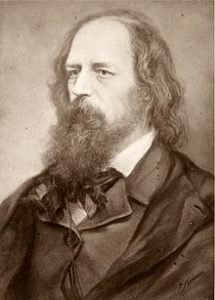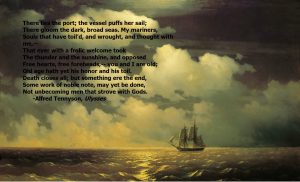Ulysses Poem: Alfred Lord Tennyson is one of the most popular British poets who was during Queen Victoria’s reign the Poet Laureate of Great Britain and Ireland. He was well known for his short lyrics and most of his verses were based on mythological themes.

Tennyson wrote Ulysses to commemorate his friend and fellow poet, Arthur Hallam, who died of a stroke at the age of 22. It was first published in “Poems” in 1842 and was termed under black verse. Although Victorians read this poem candidly and straightforwardly,
The poem is a monologue by a mythical hero, who is growing old and here he not just speaks about his discontent, but expresses his desire to keep sailing. He is getting older and instead of waiting for death, he wants to stay busy living. The conclusion of the poem has his resolution “to strive, to seek, to find and not to yield”.
Different Perspectives of Critics
However, some of the nineteenth-century critics view Ulysses as the most unconscious confessions of a king who has failed. He wishes to abandon his family as well as his kingdom with a desire to explore more in life. However, it is true that Tennyson’s Ulysses is not a perfect man.
He even proposes to leave his wife and family, run away from his duties and risk the lives of his companions also. But what Tennyson wants to show is that his search is his reason for living and he wants to say that instead of leaving his search and stay to welcome death when it comes, he wants to live till the end of his life.

Some critics feel that the poem is first addressed to himself and later it is directed to the audience. However, if the poem is considered a long speech, directed towards an actual audience, the poem is understood better.
The king of the poem chooses his son as his successor in the second part of the poem and he ensures that his people are well taken care of in his absence before he wishes to leave.
Tennyson’s Perspective
Tennyson had completed the poem on 20 October 1833 but it was published in his second collection of “Poems” in 1842. If the reader takes Tennyson’s personal comments, he will find that the poem ends with a high level of optimism.
The central theme of the poem seems to be making the life worth living and for this Ulysses feels the urge to go on the search for adventure, experience, and meaning. Tennyson depicts Ulysses as an old adventurer who is not ready to accept his old age and hence is longing for more quests.
In the lines,
How dull it is to pause, to make an end.
To rust unburnished, not to shine in use! (22-23)
Summary of the Ulysses Poem
The speaker of the poem, Ulysses returns to Ithaca and his family after staying away for long fighting enemies to keep his realm protected. His life was devoted to fighting wars and traveling to lands which were dangerous and insecure. He, after returning to his kingdom, finds being an idle king is non-progressive.

He expresses how boring it is to stay resting at home. He means that life is meaningful only if there is some quest. Ulysses is not willing to sit and inspect on his past adventures. In fact, he is proud of his reputation and compares himself to a tool that shines only when it is used.
The speaker is aware of death hovering near him but declines to surrender to destiny. He wishes to stay engaged in exploring and living new events of life. And hence the poem ends with the line,
One equal temper of heroic hearts,
Made weak by time and fate, but strong in will
To strive, to seek, to find, and not to yield.
More Info On- The Lady of Shallot, Biography of Alfred Tennyson, Alfred Lord Tennyson